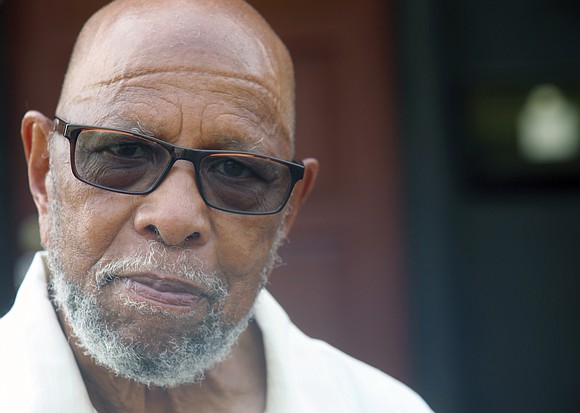Judge rules against Sa’ad El-Amin entering Lee statue lawsuit
Jeremy M. Lazarus | 10/8/2020, 6 p.m.

“Black lives still don’t matter,” former Richmond City Councilman Sa’ad El-Amin said as he left a Richmond courtroom last Friday.
Mr. El-Amin made the comment after Richmond Circuit Court Judge W. Reilly Marchant refused to allow the veteran advocate to join a lawsuit seeking to block Gov. Ralph S. Northam from removing the statue of Confederate Gen. Robert E. Lee from Monument Avenue.
Mr. El-Amin sought to intervene as a defendant alongside Gov. Northam in order to inject an African-American presence and perspective into the legal case underscoring the pain and anguish the statue has caused him and others as a symbol of white supremacy.
“I claim to be one of the injured parties that Gov. Northam spoke of June 4 when he issued the executive order for the statue to be taken down because of the pain the statue causes to people who look like me,” Mr. El-Amin argued.
He told Judge Marchant that “you have never discussed that pain, never mentioned it.” Instead, Mr. El-Amin said, the focus has been solely on the property interests of the plaintiffs who brought the suit rather then considering the broader issues of the statue’s impact on others.
In response, Judge Marchant ruled that neither Mr. El-Amin nor any African-American who lacks a direct stake in the property has any rights or interests that he is bound to consider. The judge has broad discretion to determine whether to allow other parties into a case.
Over Mr. El- Amin’s objection, Judge Marchant found the only relevant interests are those of homeowners who can trace their holding back to predecessor owners who donated property for the grassy
circle on Monument Avenue where the statue and its pedestal have stood since 1890 — a six-story behemoth of stone and metal.
“This is a results decision,” Mr. El-Amin said later. “He had a result he wanted and overthrew all jurisprudence to achieve that result.”
For example, Mr. El-Amin noted that Judge Marchant allowed both Patrick McSweeney, an attorney for the property owners who want the statue to remain in place, and assistant Virginia Attorney General Jacqueline C. Hedblom, who is representing the governor, to object to his intervention verbally without submitting written statements as the rules of the state Supreme Court require. Mr. El-Amin argued the two parties had waived their right to object with their failure to respond.
Ultimately, Judge Marchant found that Mr. El-Amin failed to meet the same high bar of standing — the right to sue — as the plaintiffs who brought the suit in determining that the emotional impact of the statue was insufficient.
“But I am not a plaintiff. I sought to be a defendant. I’m not trying to sue the government,” Mr. El-Amin said.
In court, he told the judge that African-Americans were not consulted about the statue when it was put up 120 years ago and now are being cut out of any role in the decision on whether the offensive statue should come down.
Judge Marchant in an August ruling signaled that he is more likely than not prepared to rule in the property owners’ favor.
He is to consider arguments Monday, Oct. 19, on whether to transform the temporary injunction into a permanent block on the governor’s authority to remove the Lee statue, but has indicated he believes the plaintiffs are likely to prevail on the merits, a key element that must be satisfied to first gain a temporary injunction.






